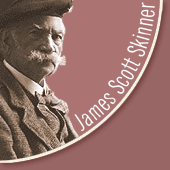




Please click any thumbnail image to view the full details.
There are 900 entries.
prev 10 | 56 > 57 > 58 > 59 > 60 > 61 > 62 > 63 > 64 > 65 | next 10 of 90 pages
| Image | Title | Item Description |
|---|---|---|
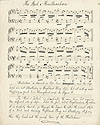 JSS0614 |
Page 3 of 4, The Reel o' Hoolichan | Manuscript, in Gavin Greig's hand, of page 118 in Skinner's Harp and Claymore Collection. Skinner's note about the differences between this reel and the 'Reel o' Tulloch' were printed below the tune, as here. This is the final draft, the copy used by the printers when they set the music for publication. Afterwards, the publishers Bayley and Ferguson (London and Glasgow) returned the draft copy to Greig. |
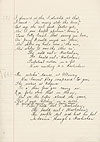 JSS0615 |
Page 4 of 4, The Reel o' Hoolichan | Manuscript, in Gavin Greig's hand, of page 119 in Skinner's Harp and Claymore Collection. Verses 5 and 6 (which do fit the tune) of the poem 'The Reel o' Hoolichan' by Robert Ford, Glasgow. This is the final draft, the copy used by the printers when they set the music for publication. Afterwards, the publishers Bayley and Ferguson (London and Glasgow) returned the draft copy to Greig. |
 JSS0616 |
Sandie Grant o' Battangorm | Manuscript, in Gavin Greig's hand, of the second tune on page 120 in Skinner's Harp and Claymore Collection. This is the final draft, the copy used by the printers when they set the music for publication. Afterwards, the publishers Bayley and Ferguson (London and Glasgow) returned the draft copy to Greig. Sandie, b. 1856, (or 'Sandy', a short form of Alexander) was the conductor of the Highland Strathspey and Reel Society, begun in 1903. He also made an innovative fishing rod, "The Grant Vibration Rod", based on principles of acoustical resonance. He experimented with violin design, and invented the 'Rondello', a fiddle with a round body. (One may be seen at the Inverness Museum and Art Gallery.) |
 JSS0617 |
G S Mackay | Manuscript, in Gavin Greig's hand, of the second tune on page 128 of Skinner's Harp and Claymore Collection. Mackay was a 'Fellow member with the Composer of Dr Mark's "Little Men". (Skinner was apprenticed to the Manchester-based band when he was nine years old.) This is the final draft, the copy used by the printers when they set the music for publication. Afterwards, the publishers Bayley and Ferguson (London and Glasgow) returned the draft copy to Greig. |
 JSS0618 |
The Mathematician | Manuscript, in Gavin Greig's hand, of the first tune on page 130 in Skinner's Harp and Claymore Collection. He was 'Dr Clark, Cairo', an Aberdeen academic who had moved to Egypt. This is the final draft, the copy used by the printers when they set the music for publication. Afterwards, the publishers Bayley and Ferguson (London and Glasgow) returned the draft copy to Greig. |
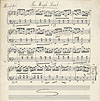 JSS0619 |
The High Level | Manuscript, in Gavin Greig's hand, of the first tune on page 136 in Skinner's Harp and Claymore Collection. The High Level hornpipe was written by 'Jamie [James] Hill', best-known for this type composition. He was probably born in Dundee, but spent most of his life in Gateshead, by Newcastle-on-Tyne. This is the final draft, the copy used by the printers when they set the music for publication. Click on the audio link to hear Skinner playing it. |
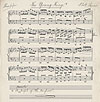 JSS0620 |
The Young King | Manuscript, in Gavin Greig's hand, of page 140 in Skinner's Harp and Claymore Collection. The 'Young King' was 'A favourite pupil of the composer.' This is the final draft, the copy used by the printers when they set the music for publication. Afterwards, the publishers Bayley and Ferguson (London and Glasgow) returned the draft copy to Greig. |
 JSS0621 |
Glencoe | Manuscript, in Gavin Greig's hand, of page 147 in Skinner's Harp and Claymore Collection. Skinner's 'Dirge' [Lament] 'Glencoe' was written in memory of the Argyllshire village where 38 people were massacred in 1692. This is the final draft, the copy used by the printers when they set the music for publication. Afterwards, the publishers Bayley and Ferguson (London and Glasgow) returned the draft copy to Greig. Listen to Skinner playing this lament by clicking on the audio link below. |
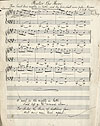 JSS0622 |
Page 1 of 2, Hector the Hero | Manuscript, in Gavin Greig's hand, of page 152 in Skinner's Harp and Claymore Collection. This is the final draft, the copy used by the printers when they set the music for publication. Afterwards, the publishers Bayley and Ferguson (London and Glasgow) returned the draft copy to Greig. This 'Lament' and the poem (JSS0623) was for Sir Hector Macdonald (1853-1903) b. nr Dingwall, Ross-shire; d. Paris. He served at the Battle of Khartoum; Knighted in 1901. Aide-de Camp to Queen Victoria, and Major-General in the British army. He had one son with his wife Christina Duncan, secretly married, in the Scottish style, in 1884. Unsavoury rumours and illness drove him to suicide. 'Fighting Mac', a Robert B. Service (1874-1958) poem, and Thomas McWilliam's words to 'Hector the Hero' - 'O, wail for the mighty in battle,/ Loud lift ye the Coronach strain;/ For Hector, the Hero, of deathless fame,/ Will never come back again' - show the public's sympathy for his tragic end. |
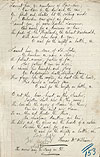 JSS0623 |
Page 2 of 2: Words, Hector the Hero | Manuscript, in Gavin Greig's hand, of page 153 in Skinner's Harp and Claymore Collection. This is the final draft, the copy used by the printers when they set the music for publication. Afterwards, the publishers Bayley and Ferguson (London and Glasgow) returned the draft copy to Greig. This 'Lament' and the poem (JSS0623) was for Sir Hector Macdonald (1853-1903) b. nr Dingwall, Ross-shire; d. Paris. He served at the Battle of Khartoum; Knighted in 1901. Aide-de Camp to Queen Victoria, and Major-General in the British army. He had one son with his wife Christina Duncan, secretly married, in the Scottish style, in 1884. Unsavoury rumours and illness drove him to suicide. 'Fighting Mac', a Robert B. Service (1874-1958) poem, and Thomas McWilliam's words to 'Hector the Hero' - 'O, wail for the mighty in battle,/ Loud lift ye the Coronach strain;/ For Hector, the Hero, of deathless fame,/ Will never come back again' - show the public's sympathy for his tragic end. |
prev 10 | 56 > 57 > 58 > 59 > 60 > 61 > 62 > 63 > 64 > 65 | next 10 of 90 pages
